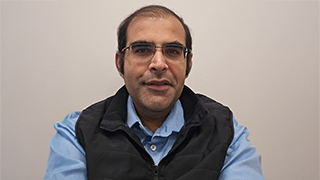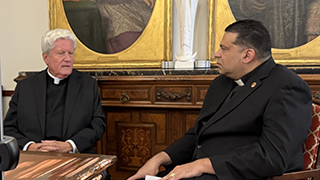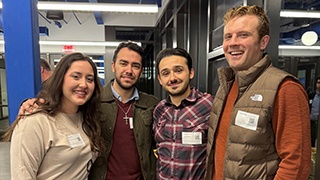Diplomacy Alumnus to Seton Hall Professor: Shaping the Next Generation at Seton Hall
Monday, October 13, 2025

Prashant Suhas, Ph.D.
Prashant Suhas, Ph.D. teaches Comparative Foreign Policy and International Relations at Seton Hall’s School of Diplomacy and International Relations, where he combines academic rigor with practical insight drawn from years of research and policy experience. An alumnus of the School of Diplomacy himself, Suhas now teaches in the same program where he once studied, bringing his academic and professional journey full circle. His approach to teaching reflects the balance that defines his career, bridging theoretical frameworks with the realities of international security and state behavior.
Suhas first came to Seton Hall as a graduate student seeking a program that connected academic study with policymaking. “I was looking to pursue a career in security and foreign policy where I got to bridge the gap between academia and policy making,” he explained. “Seton Hall’s curriculum was designed to equip students with those skills.” After earning his MA, he worked at an influential think tank in New Delhi before pursuing his doctoral research, a path that shaped his perspective on how scholarship can inform global policy.
What ultimately drew Suhas to teaching, particularly at Seton Hall, was the connection he saw between research and instruction. “Teaching and research tend to have a symbiotic relationship,” Suhas said. “I bring a lot of my policy and research experience to bear on my teaching, while teaching new material in class has sometimes inspired new projects.” He noted that Seton Hall provides an ideal environment for this saying, “people here care about how the policy world can enrich academia and how academia can influence the policy world.”
His current research extends to several projects. One examines why interstate rivalries persist, arguing that conflicts between states are often sustained by their connection to broader regional and historical networks. “Interstate rivalries tend to persist because they are not only affected by issues specific to their bilateral relations but are also affected because they tend to be embedded in other interlinked rivalries and regional issues,” he said. This framework highlights how seemingly isolated disputes often endure because of the larger political systems they exist in.
Another project studies how a state’s complex threat environment contributes to expansions in certain types of state capacity. “This work speaks to the broader academic literature on war-making and state-making,” he explained, “and becomes relevant to policymakers as rivalries tend to spur growth in certain industrial sectors.”
Suhas’ third project focuses on the Sino-Indian rivalry, an area he believes has been largely understood in material terms but insufficiently examined. “Much has been written on the material and geostrategic dimensions of the rivalry, but little is understood about its ideological underpinnings,” he said. His work traces how colonial legacies shaped both China’s and India’s strategic worldviews and fostered a shared sense of ‘victimhood’ that continues to inform their engagement with the international order.
In his teaching, Suhas hopes to cultivate in students the same intellectual curiosity that inspired him during his time as a diplomacy student. “My professors did not just teach course material, but modeled intellectual curiosity and creativity,” he reflected. “I try to create a space where students are encouraged to take intellectual risks that expand our understanding of the complex world we live in.”
Suhas describes his goal in simple terms: helping students recognize their strengths and use them meaningfully. “The purpose,” he said, “is to help students find their voice and use it constructively.” Through both his teaching and research, Professor Suhas embodies the School of Diplomacy’s mission of connecting academics with practice.






